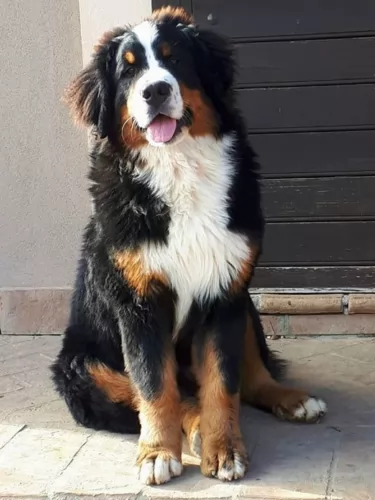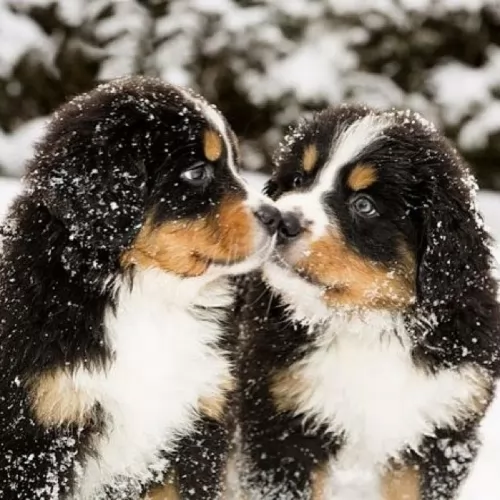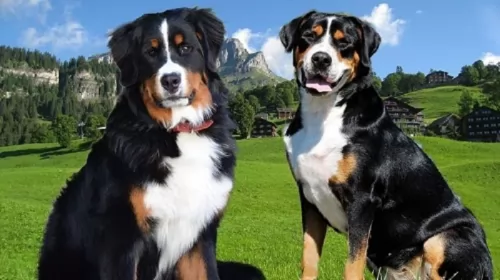 Petzlover
Petzlover Mountain Burmese is originated from Myanmar but Tibetan Terrier is originated from China. Mountain Burmese may grow 30 cm / 12 inches higher than Tibetan Terrier. Mountain Burmese may weigh 55 kg / 122 pounds more than Tibetan Terrier. Mountain Burmese may live 7 years less than Tibetan Terrier. Both Mountain Burmese and Tibetan Terrier has same litter size. Mountain Burmese requires Low Maintenance. But Tibetan Terrier requires Moderate Maintenance
Mountain Burmese is originated from Myanmar but Tibetan Terrier is originated from China. Mountain Burmese may grow 30 cm / 12 inches higher than Tibetan Terrier. Mountain Burmese may weigh 55 kg / 122 pounds more than Tibetan Terrier. Mountain Burmese may live 7 years less than Tibetan Terrier. Both Mountain Burmese and Tibetan Terrier has same litter size. Mountain Burmese requires Low Maintenance. But Tibetan Terrier requires Moderate Maintenance
 The Burmese Mountain Dog is quite often taken to be the Bernese Mountain Dog, a Swiss farm dog. However, the Burmese Mountain Dog comes not from Switzerland but from Myanmar and Burma. The Burmese was bred to hunt skunks and guard livestock for the northern tribesman of Myanmar. The way they hunted for the aggravating skunks was to hide themselves in the underbrush and wait for the skunk to go by. Their facial markings confuse skunks when they see him in the bush with a black and white face. At the same time, his rust color lets the hunter know he is the dog not the skunk.
The Burmese Mountain Dog is quite often taken to be the Bernese Mountain Dog, a Swiss farm dog. However, the Burmese Mountain Dog comes not from Switzerland but from Myanmar and Burma. The Burmese was bred to hunt skunks and guard livestock for the northern tribesman of Myanmar. The way they hunted for the aggravating skunks was to hide themselves in the underbrush and wait for the skunk to go by. Their facial markings confuse skunks when they see him in the bush with a black and white face. At the same time, his rust color lets the hunter know he is the dog not the skunk.
The Mountain Burmese is an incredible athlete despite the size. They are agile. They are quick. They can climb trees – as many as fifty feet while chasing a skunk. They also make a great companion and love to be a family dog. They are calm and gentle as an adult and great with kids. They are easily trained but remember they can climb trees. However, they do not do well with cats that are black and white or solid black because they confuse them with the skunk prey.
 The Tibetan Terrier is a medium-size breed of dog that originated in Tibet. He has always been kept as a pet and companion for Tibetan monks.
The Tibetan Terrier is a medium-size breed of dog that originated in Tibet. He has always been kept as a pet and companion for Tibetan monks.
He is still a popular companion dog, more so because he is thought to be hypoallergenic, so that even allergy sufferers can enjoy a canine friend.
This isn't a new dog breed, and if you have to go according to records, they have been around for more than 2000 years as herding dogs.
The first Tibetan Terrier was brought to Europe in 1922. The first Tibetan Terriers in the US were imported in 1956 and in 1973 the American Kennel Club recognized the breed. They're classified as a non-sporting breed.
 The Mountain Burmese Dog is a large, sturdy, well built and athletic canine. Strong and well balanced, he is agile and athletic when it comes to the work, he has to do in chasing skunks. He has a full body with a large head and dark, oval eyes. The Burmese has triangular ears close to his head and medium in size. With a flat, broad skull the muzzle is straight and strong. They have black noses and a scissors bite, on their muscular, strong neck. With a deep chest and broad back, they have strong ribs. Finally, the tail is bushy, long and hangs low.
The Mountain Burmese Dog is a large, sturdy, well built and athletic canine. Strong and well balanced, he is agile and athletic when it comes to the work, he has to do in chasing skunks. He has a full body with a large head and dark, oval eyes. The Burmese has triangular ears close to his head and medium in size. With a flat, broad skull the muzzle is straight and strong. They have black noses and a scissors bite, on their muscular, strong neck. With a deep chest and broad back, they have strong ribs. Finally, the tail is bushy, long and hangs low.
 The Tibetan Terrier is a medium-sized dog weighing about 8 – 14kg and standing at about 35 – 41cm in height.
The Tibetan Terrier is a medium-sized dog weighing about 8 – 14kg and standing at about 35 – 41cm in height.
People liken him to the Bearded Collie in looks. The long, shaggy, double coat of the dog is available in a number of colors such as white, grey, golden, black or tri-colored.
The dog is powerful and squarely built with floppy ears and a tail that is well feathered, long and carried curled over the back.
He has always been a dog kept by Tibetan monks. There is nothing aggressive about this dog at all and he is sweet, reserved, gentle and sensitive while also being playful and social with his human family.
These dogs thrive on human companionship and are often used as therapy dogs. He is energetic and active and will require regular exercise. He is able to adjust to life in the city or the countryside, but wherever he is, his exercise needs can never be neglected.
 Tibetan Terriers are loyal ad devoted to their human family. They’re social dogs and won’t do well stuck in the back yard.
Tibetan Terriers are loyal ad devoted to their human family. They’re social dogs and won’t do well stuck in the back yard.
They are sensitive dogs, being able to sense the mood of those whom they love. They also make good watchdogs. They’re ideally suited to people who can give them the attention they crave, making splendid pets and companions.
 The kind of health issues that most large or giant dogs have to deal with are some of the same things that this breed dealt with.
The kind of health issues that most large or giant dogs have to deal with are some of the same things that this breed dealt with.
 Your Tibetan Terrier can live to be between 10 and 14 years of age but even so it is susceptible to a host of health problems. Some of the problems you may have to contend with are hip dysplasia, eye problems and heart murmurs.
Your Tibetan Terrier can live to be between 10 and 14 years of age but even so it is susceptible to a host of health problems. Some of the problems you may have to contend with are hip dysplasia, eye problems and heart murmurs.
This is a serious condition where the femur doesn't fit snugly into the pelvic socket of the hip joint. It can be painful and cause lameness even. Dogs that have hip dysplasia most certainly shouldn't be bred.
Heart murmurs are extra heart vibrations. This is because of a disturbance in the blood flow so as to produce an audible noise.
Sometimes the sound is barely audible but it can also be louder and your pet can show signs of congestive heart failure such as coughing, not being able to tolerate exercise, and being lethargic and weak.
 Feed a high quality dog food designed for large or giant puppies. Feed 3times a day 2.5 times for puppies and go easy on the treats
Feed a high quality dog food designed for large or giant puppies. Feed 3times a day 2.5 times for puppies and go easy on the treats
There is a definite tendency for these dogs to become obese. Don’t overfeed. Don’t free feed. Large breed high quality dog food should be fed 2 times a day and go easy on the treats. Watch his weight.
strength, stamina
The breed is definitely athletic and active. They love to chase and take long walks daily. They need a large yard but be careful as they can climb trees and your fence. They are great companions when backpacking and camping. If there are skunks in the area however watch out! These are hunting dogs despite their size and they would do very well in barn hunt and field trials.
 The Tibetan will require good food and exercise to stay healthy. The commercially manufactured dog foods are always a convenient choice, but make sure to give your pet one of the better brand foods, otherwise you feed him a lot of useless ingredients such as fillers, preservatives and colorants from the cheap, inferior brands.
The Tibetan will require good food and exercise to stay healthy. The commercially manufactured dog foods are always a convenient choice, but make sure to give your pet one of the better brand foods, otherwise you feed him a lot of useless ingredients such as fillers, preservatives and colorants from the cheap, inferior brands.
Feed him some home-made food too just to add a little bit of variety to his diet. Boiled chicken, brown rice or pasta and spinach, sweet potatoes and carrots are a healthy choice for your pet.
Avoid people foods such as chocolates, onions, spices, chips etc as these can just upset his stomach and push your vet fees up. Always ensure he has a constant supply of fresh, cool water.
Brush your Tibetan Terrier. He has a long shaggy coat so will require brushing at least twice a week.
Brushing your dog regularly will help to reduce shedding. Many people opt to take the dog to professional groomers and have the coat professionally clipped. The groomers will also trim your dog’s nails and clean the inside of your dog’s ears.
Before you get a dog, make sure you have a reliable veterinarian. It’s no good if your pet becomes ill, maybe even some kind of an emergency, such as bloat, and you don’t know where to take your pet.
You need to be aware of a vet that is open 24/7. Your Tibetan will need to have your vet vaccinate him against some of the deadly diseases there are.